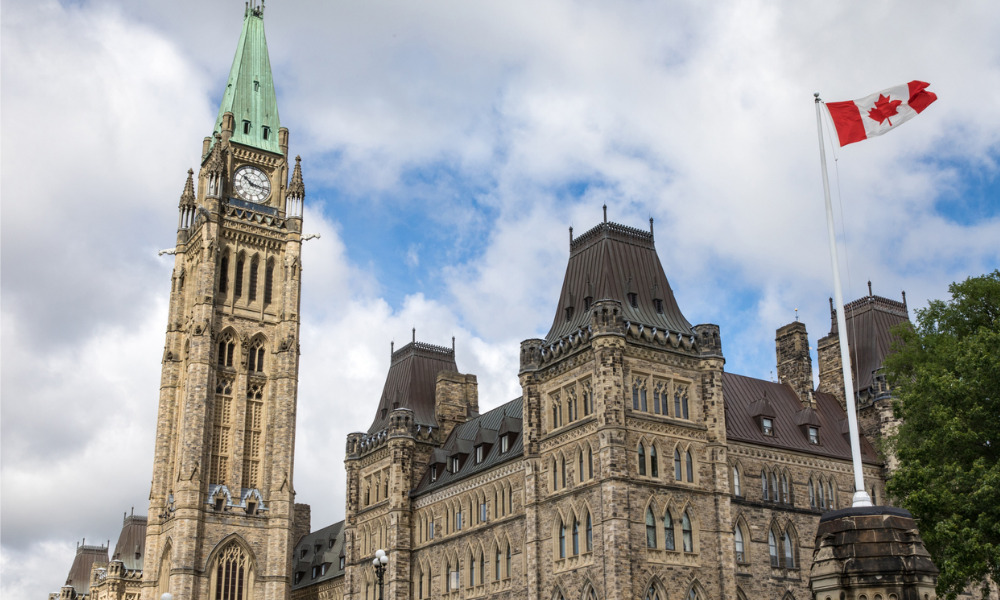Federal finance minister Chrystia Freeland delivered the Fall Economic Statement on Thursday

The Canadian government reaffirmed some commitments on tax and announced some new measures in its Fall Economic Statement on Thursday.
Finance minister Chrystia Freeland said that the government will spend almost half of a near $30 billion revenue windfall this fiscal year including some measures that were announced in September, while leaving much of the ‘heavy lifting’ on inflation to the Bank of Canada.
“Today’s Fall Economic Statement is focused on building an economy that works for everyone—an economy that creates good jobs and which makes life more affordable for Canadians,” Freeland said. “Even as we face global headwinds, the investments we are making today will make Canada more sustainable and more prosperous for generations to come.”
The government budget deficit will be cut to $30.6 billion next year with the budget effectively balanced by 2026.
The Montreal Economic Institute economist Oliver Rancourt commented that the government cannot take credit for the reduction of the deficit.
"It's not so much due to the responsible administration of public funds, but rather to the dramatic increase in tax revenues thanks to inflation being higher than expected,” he said.
Rancourt noted the high cost of government debt with interest payments set to jump 41% year-over-year to almost $35 billion this year.
"Every dollar spent to service the debt is a dollar that will neither serve to fund services nor be returned to Canadian taxpayers," he said. "The government has every reason to return to a balanced budget very quickly, before interest rates make it that much harder to do so."
Help for families
Low-income families will be assisted with the rising cost of living through a new $4 billion fund over four years for those who qualify for the low-income benefit program, while there will be permanently interest-free student loans for low-income students.
There will also be measures to tackle the housing affordability issue including treating flipping of homes to be business income if it takes place within 12 months of the house purchase. Exceptions will include life events such as divorce or death.
Also mentioned was the previously-announced tax-free First Home Savings Account.
Taxing the wealthy
Previous talk of wealth taxes are still on the table with the statement saying that there has not been a substantial review of the Alternative Minimum Tax since 1986.
A detailed proposal for how to ensure the wealthiest Canadians pay their fair share of tax will be announced in Budget 2023.
“The finance minister is signaling constraint in the update, but the taps are hardly closed with more than $23+ bn set to reach pocketbooks in the coming quarters once provincial affordability measures are folded in,” wrote Scotiabank economist Rebekah Young.
She added that the government would leave a bigger focus on growth until Budget 2023.
“That may come back to bite the government in the event of a sharper downturn, when support may be needed, but not necessarily in the places it is being directed today. And a tax-and-spend approach starts to stutter,” she said.
Business reaction
Chrystia Freeland confirmed previous reports of a new tax on share buybacks at 2% on the net value of all types of buybacks from January 2024, and there will be new incentives for businesses to invest in clean technologies with tax credits of up to 30%.
In the statement, she also reaffirmed the government’s commitment to work with international partners to tackle profits of multinationals, such as introducing a global minimum tax.
The Canadian Federation of Independent Business slammed the government for not providing enough support for struggling firms.
“Small firms need help right now in dealing with the crippling labour shortage and rapidly rising costs,” said CFIB president Dan Kelly. “Unfortunately, Ottawa is making their problem even bigger with significant hikes in Employment Insurance and Canada Pension Plan premiums on January 1, and carbon and excise tax hikes in the spring of 2023. There are zero measures in this document that will lower the tax pressures facing Canada’s small firms.”
Kelly added that there was no progress in addressing the crippling legacy of the pandemic debt carried by small business owners.
However, the CFIB president did welcome the path to a balanced budget and measures to tackle credit card fees for businesses.
“While I’m concerned credit card fee relief may be too slow to help deal with the immediate inflationary cost pressures facing small business, the direction is positive and should encourage negotiations with card networks and banks towards an early deal. CFIB is especially pleased to see government plans to ensure businesses have a seat at the table in negotiating lower transaction fees specifically focused on small businesses,” Kelly added.



